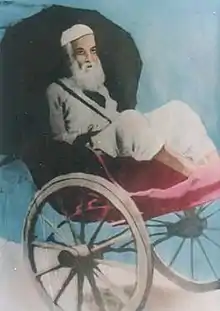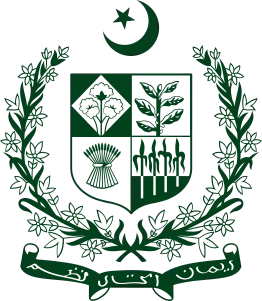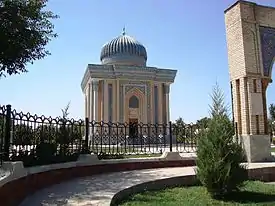Ashraf Ali Thanwi
Muḥammad Ashraf 'Alī Thānvī (19 August 1863 – 4 July 1943) (5 Rabi' al-Thani 1280 – 17 Rajab 1362 AH) (Urdu: مولانا اشرف علی تھانوی) was an Indian Sunni scholar and a Sufi mentor of the Hanafi school. He wrote the tafsīr Bayan Ul Quran and Bahishti Zewar.
Muhammad Ashraf 'Ali | |
|---|---|
 | |
| Title | Hakīm al-Ummah |
| Personal | |
| Born | 19 August 1863[1] |
| Died | 20 July 1943 (aged 79)[2] |
| Resting place | Thana Bhawan[2] |
| Religion | Islam |
| Nationality | Indian |
| Ethnicity | Indian |
| Era | Modern era |
| Denomination | Sunni |
| Jurisprudence | Hanafi |
| Creed | Maturidi[3] |
| Movement | Deobandi |
| Main interest(s) | Tasawwuf |
| Notable idea(s) | Reformation, Moderation, and Islamisation of every aspect of life, creation of Pakistan, Two-nation theory |
| Notable work(s) | Bayan Ul Quran, Perfecting women |
| Occupation | Islamic scholar |
| Muslim leader | |
| Disciple of | Imdadullah Muhajir Makki |
Influenced by
| |
Influenced
| |
Early life and career
Childhood
He lost his mother at the age of five and was raised by his father with special care and attention. His father taught him and his younger brother, Akbar 'Ali, discipline and good character.[2]
Career
After his graduation, Thanawi taught books of religious sciences in Faiz-e-Aam Madrasa, Kanpur.[2] Over a short period of time, he acquired a reputable position as a religious scholar of Sufism among other subjects.[4][2][5] His teaching attracted numerous students and his research and publications became well known in Islamic institutions. During these years, he traveled to various cities and villages, delivering lectures in the hope of reforming people. Printed versions of his lectures and discourses usually became available shortly after these tours. Until then, few Islamic scholars had had their lectures printed and widely circulated in their own lifetimes. The desire to reform the masses intensified in him during his stay at Kanpur.[2]
Eventually, Thanwi retired from teaching and devoted himself to reestablishing the spiritual centre (khānqāh) of his mentor, Imdadullah Muhajir Makki, in Thāna Bhāwan, UP, India.[2]
Opposition by Barelvis
In 1906, Ahmad Raza Khan and other scholars issued a fatwa against Thanwi and other Deobandi leaders entitled Husam ul-Haramain (Urdu: Sword of The two Holy Mosques), calling them unbelievers and Satanists.[6][7][8][9]
Deobandi elders, including those accused in the Fatwa, prepared a reply to questions sent to them by the scholars of Hijaz to clarify the matter. Thus, Khalil Ahmad Saharanpuri's al-Muhannad 'ala al-Mufannad (The Sword on the Disproved), was written in Arabic and signed by all Deobandi scholars including Ashraf Ali Thanvi.[10][11][12] Upon seeing the clarification, the scholars of Hijaz retracted their approval of Ahmed Raza Khan's Fatwa which was published at the end of the aforementioned Al Muhannad.[13][14] Thanwi's disciple Murtaza Hasan Chandpuri also wrote articles and leaflets in defence of Thanwi.[15]
Teachings
Ashraf Ali Thanvi stressed on adopting the complete way of Islam to attain salvation. He shunned those Sufis who stressed on voluntary worshiping but neglected other important commandments of Islam including fair dealings and fulfilling the rights of others. Thus his stress would be more on the basic personal reformation and the prescription of Wazaif would come later.[16]
At times, he would caution and stress towards matter that are generally thought to be not related to Islam and spirituality but he would explain the forgotten and ignored link. For example, once he stressed the son of his close disciple, Mufti Muhammad Shafi, to improve his handwriting so that others may read it with ease. Thereafter, he remarked that he was nurturing him to become a 'Sufi' by stressing upon this matter (since being mindful of other's comfort was central to his teachings of Sufism).[17]
Political ideology
Ashraf Ali Thanvi was a strong supporter of the Muslim League.[18] He maintained a correspondence with the leadership of All India Muslim League (AIML), including Muhammad Ali Jinnah. He also sent groups of Ulama to give religious advice and reminders to Mr. Jinnah.[19][20]
He and his pupils gave their entire support to the demand for the creation of Pakistan.[21] During the 1940s, many Deobandi ulama supported the Congress but Ashraf Ali Thanvi and some other leading Deobandi scholars including Muhammad Shafi and Shabbir Ahmad Usmani were in favour of the Muslim League.[22][23] Thanvi resigned from Deoband's management committee due to its pro-Congress stance.[24]
His support and the support of his disciples for Pakistan Movement were greatly appreciated by the leadership of AIML.[19][20] This can be gauged from the fact that Pakistan became independent, its first flag hoisting in West Pakistan was done by Allama Shabbir Ahmad Usmani in the presence of Muhammad Ali Jinnah and Liaqat Ali Khan; while in East Pakistan, it was done by Allama Zafar Ahmad Usmani in the presence of Khwaja Nazimuddin.[25][26]
Literary works
Thanwi authored 345 books and booklets, while the collections of his speeches exceed 300.[27] The total numbers of publications attributed to him (i.e. his own writings and the transcription of his speeches and anecdotes and his letters) are said to cross over 1000. Some of his publications in English include:
- The wisdom behind the commands of Islam
- Bayan Ul Quran
- Perfecting women
- The principles and codes of law in Hanafi Fiqh
- Answer to modernism
- Remedies from the Holy Qurʼaan : an abridged translation of Aʼmaale Qurʼaani
- Maulana Thanwi's stories of saints : translation, Qisasul akbir
- Philosophy of Islam
- The objective distinction between the desirable and the dreadful
- Deed & retribution : an Islamic approach to the question
- Islam the whole truth
- Desire for the Aa-khirah
- A Remedy for droughts and calamities
Legacy
His Fatwas and religious teachings were thought to be very authoritative even by many of his opponents. Thus many of his contemporaries also sought his advice and held him in high esteem. For example, when the Indian scholar, historian and linguist, Sayyid Sulaiman Nadwi, wished to seek Islamic spirituality, he went to Thana Bhawan. Another Indian scholar, Abdul Majid Dariyabadi, did the same. Even Muhammad Iqbal once wrote to a friend of his that on the matter of Rumi's teachings, he held Maulana Ashraf Ali Thanwi as the greatest living authority.[28]
Pakistani scholar Muhammad Ishaq Multani has written a 10 volume encyclopaedia about the history of Thanwi's reform works. It also includes biographies and works done by the disciples of Thanwi up to four generations. Contemporary scholars like Mufti Taqi Usmani have written words of praise for this encyclopaedia.[29][30]
See also
References
- 'Islamic Years Converted to AD years' on the Conversion Chart on google.com website Retrieved 11 August 2020
- Profile of Ashraf Ali Thanwi on haqislam.org website Published 9 November 2014, Retrieved 11 August 2020
- "Salafī Challenge and Māturīdī Response: Contemporary Disputes over the Legitimacy of Māturīdī kalām". Brill.
- Ali Abbasi, Shahid. (2008, January–March)
- Rethinking in Islam: Mawlana Ashraf 'Ali Thanawi on Way and Way-faring. Hamdard Islamic-us, 21(1), 7–23. (Article on Ashraf 'Ali's teachings on Sufism.)
- 'Arabic Fatwa against Deobandis' Sufi Manzil website, Published 3 May 2010, Retrieved 11 August 2020
- Ahmad Raza Khan. Hussam-ul-Harmain
- Fatawa Hussam-ul-Hermayn by Khan, Ahmad Raza Qadri
- As-samare-ul-Hindiya by Khan, Hashmat Ali
- "Al-Muhannad ala 'l-Mufannad | daruliftaa.com". www.daruliftaa.com. Retrieved 28 September 2019.
- Al Muhannad 'ala Al Mufannad Urdu.
- "Al Muhannad 'ala Al Mufannad English". archive.org. Retrieved 28 September 2019.
- "Molwi Ahmed Radha Khan among the Arab Ulama". Pearls of the Elders. 2 April 2007. Retrieved 28 September 2019.
- Shah, Syed Talha (20 November 2018). "TTP and TLP: different labels, similar ideology?". Daily Times. Retrieved 28 September 2019.
- Mawlānā Ashraf Ali Thanwi. Hifz al-Iman. Dar al-Kitab, Deoband. p. 19.
- 'abd (18 September 2019). "The essential instructions for mureed". ASHRAFIYA. Retrieved 28 September 2019.
- Talhah, Sayyid (5 August 2018). "Handwriting and Spirituality". Pearls for Tazkiyah. Retrieved 28 September 2019.
- "'What's wrong with Pakistan?'". Dawn. 13 September 2013. Retrieved 22 January 2020.
- Khan, Munshi Abdur Rahman. Tehreek e Pakistan aur Ulama e Rabbani. Karachi, Pakistan.
- Saeed, Professor Ahmad. Maulana Ashraf Ali Thanwi aur Tehreek e Azadi. Lahore, Pakistan.
- Shafique Ali Khan (1988). The Lahore resolution: arguments for and against : history and criticism. Royal Book Co.
- Svanberg, Ingvar; Westerlund, David (6 December 2012). Islam Outside the Arab World. Routledge. p. 224. ISBN 978-1-136-11322-2.
- Jetly, Rajshree (27 April 2012). Pakistan in Regional and Global Politics. Taylor & Francis. pp. 156–. ISBN 978-1-136-51696-2.
- Robinson, Francis (2000). "Islam and Muslim separatism.". In Hutchinson, John (ed.). Nationalism: Critical Concepts in Political Science. Anthony D. Smith. Taylor & Francis. pp. 929–930. ISBN 978-0-415-20112-4.
- Talhah, Sayyid (22 November 2018). "Asia Bibi case: Pakistanis need to bridge the 'mister-mulla' divide". Musings of a Muslim Doctor. Retrieved 1 October 2019.
- "NPT sitting on Usmani". The Nation. 9 December 2014. Retrieved 1 October 2019.
- Mahmood Ahmed Ghazi. The Islamic Renaissance in South Asia (1707-1867): The Role of Shah Waliallah and His Successors (2004 ed.). New Delhi: Adam Publishers & Distributors. p. 251.
- Maqalat-e-Iqbal; Compiled by Syed Abdul Wahid Mueeni
- https://taleefat.com/index.php?route=product/product&product_id=146&tag=Karwan-mujaddid-thanvi-RA
- Ashraf Ali Thanwi book on quranwahadith.com website Retrieved 11 August 2020
Further reading
- Zaman, Muhammad Qasim, Ashraf `Ali Thanawi: Islam in Modern South Asia (Makers of the Muslim World), Oneworld, 2007.
- Ahmed, Muniruddin,
External links
- Collection of Ashraf Ali Thanwi in PDF-format

